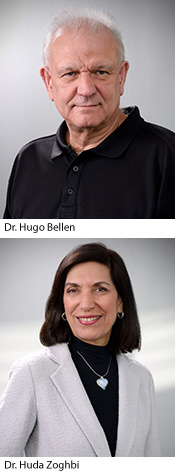
Dr. Bellen elected to National Academy of Sciences
Dr. Hugo J. Bellen, professor of molecular and human genetics and neuroscience at Baylor College of Medicine, a Howard Hughes Medical Institute investigator and researcher at the Jan and Dan Duncan Neurological Research Institute (NRI) at Texas Children’s, has been elected to the prestigious National Academy of Sciences in recognition of distinguished and continuing achievements in original research.
Bellen is one of the world’s premier researchers in Drosophila, or fruit fly, genetics. His group has made major contributions to the understanding of nervous system development, synaptic transmission and mechanisms of neurodegeneration. As the head of the Drosophila Gene Disruption Project, his laboratory has developed numerous sophisticated genetic tools and generated tens of thousands of reagents that have transformed Drosophila biology. His reagents are used by nearly every fly biologist.
Bellen’s current research focuses on the discovery of new rare human disease genes and elucidating the pathogenic mechanisms of neurodevelopmental and neurodegenerative diseases using fruit flies, in collaboration with human geneticists worldwide. His lab is the home of the Model Organism Screening Center for the Undiagnosed Diseases Network of the NIH. He has made major strides in solving key problems related to 25 rare human diseases, and these studies also have revealed probing knowledge about Friedreich ataxia, Alzheimer disease, Amyotrophic Lateral Sclerosis and Parkinson disease.
In addition, Bellen is among 276 artists, scholars, scientists and leaders in the public, non-profit, and private sectors elected to the American Academy of Arts and Sciences for the class of 2020. Founded in 1780, the American Academy of Arts and Sciences was created to honor exceptionally accomplished individuals and engage them in advancing the public good. Today, the Academy continues to dedicate itself to recognizing excellence in a broad array of fields.
Click here to read the full article featured on the NRI website.
Dr. Zoghbi awarded The Brain Prize 2020 for identifying gene that causes Rett syndrome
Neuroscientists Dr. Huda Zoghbi, director of the Jan and Dan Duncan Neurological Research Institute and a Howard Hughes Medical Investigator, and Dr. Adrian Bird, professor of genetics at Edinburgh University, received the world’s most prestigious prize for brain research – the Lundbeck Foundation Brain Prize – for their groundbreaking work to map and understand epigenetic regulation of the brain and for identifying the gene that causes Rett syndrome.
Rett syndrome is a rare neurological disorder caused by a mutation in the MECP2 gene, that primarily affects girls during their early childhood. The disorder results, to varying degrees, in mental and physical disability. During the first years of their lives, the children seem to develop normally, although they are often described as ‘easy and quiet’. However, once they reach the age of one to two, their development stagnates. Among other things, they begin to show signs of autism and to make involuntary movements with their hands. The condition eventually stabilizes and the child can then slowly begin to develop but will remain developmentally disabled for the rest of its life. Patients often have trouble breathing and sleeping and may suffer from epilepsy and scoliosis. Around 50 percent of sufferers are unable to walk.
“Drs. Adrian Bird and Huda Zoghbi are receiving The Brain Prize 2020 for their groundbreaking work to map and understand epigenetic regulation of the brain and for identifying the gene that causes Rett syndrome,” said Professor Richard Morris, chair of the Brain Prize’s Selection Committee. “Due to their research, we are also closer to a treatment breakthrough and we have come to understand that neurological developmental disorders are not necessarily irreversible.”
The Lundbeck Foundation in Denmark awards the Brain Prize annually to one or more scientists from anywhere in the world who have distinguished themselves by outstanding contributions to neuroscience. Click here to read the full article featured on the NRI website.

